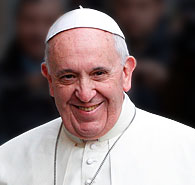The Gift of Children
Pope Francis continued his weekly catechesis on the family by turning to children during his February 11th general audience. He used the prophet Isaiah to open his reflection: “your sons shall come from far, and your daughters shall be carried in the arms. Then you shall see and be radiant, your heart shall thrill and rejoice” (60:4-5a).
The Holy Father noted that there is a “close connection between the hope of a people and the harmony between generations.” When you see a child, you can be hopeful. He said, “Children are the joy of the family and of society.” Children are gifts, not problems, says Pope Francis, and they are certainly not parents’ “possessions.” Each child is unrepeatable, and “to be a son and a daughter means to bear in oneself the memory and the hope of a love that has realized itself precisely by kindling the life of another original and new human being.” In a child, a mother and father can see a reflection of their own love. Each child, said the pope, is for the parents “unique, different, and diverse.”
Pope Francis shared a family story about his mother, who compared her five children to her five fingers, saying that each one had her love and each one was different. There was no “favorite.”
The Holy Father spoke about how the existence of the child was itself the cause of a parent’s love. “A child is loved because he is a child: not because he is beautiful, or because he is like this or like that; no, it is because he is your child!” While the child is “generated by us,” he or she is nonetheless created for his own sake, and for the good of all.
The pope named as “the most gratuitous dimension of love” the fact that we are all loved before we even take our first breath: “children are loved before they arrive,” he said, noting the many mothers in the square who ask him to bless their children in the womb. “They are loved before birth, like the love of God who always loves us first.” It is being a child, Pope Francis said, that is the “fundamental condition to know the love of God.” This love secures human dignity.
Parents may learn from God the Father how to help their children to grow, since God “leaves each one of us free but never leaves us alone,” and follows us with love even after we sin. The Holy Father said that God never moves backward in his love but only forward, urging us on. Children are given the desire to build a better world, and they should do so, the pope said, but “without arrogance, without presumption,” and still honoring their parents.
Pope Francis also spoke about the fourth Commandment and its connection to the future in Scripture. Honoring father and mother means that “your days may be long in the land which the Lord your God gives you” (Cf. Exodus 20:12). “The virtuous connection between the generations is guarantee of the future,” the pope said. Without children who honor their parents, society becomes dry. On the other hand, a society or generation that does not want children or considers them “a worry, a weight, a risk” is a “depressed” and “greedy” one. He also said that responsible parenthood does not preclude large families: “Life rejuvenates and acquires energies by multiplying itself.”
At the end of his address, Pope Francis asked the congregation to spend a moment in silence thinking about their parents and/or children. Then he prayed that the Lord Jesus, the eternal Son, would “help us to find the way of a new radiation of this very simple and very great human experience, which is being children.”
Full text available here: Source





